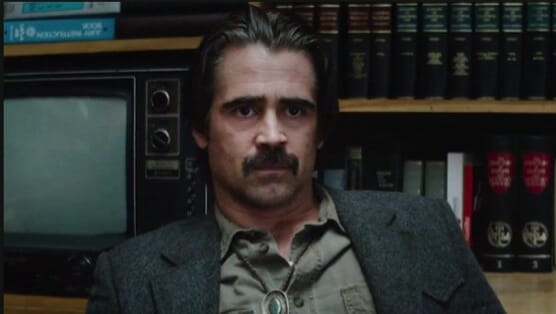True Detective: “The Western Book of the Dead”

I have never had an older sibling, but I would imagine that if I had, I’d be less than thrilled at the prospect of living up to them. Who wants to be compared to a family member when you’re a sovereign body, living out your own story? Even if you win, you lose—it neuters your independence, and defines you, good and bad, by the achievements of another entity.
So I apologize, Nic Pizzolatto, for all the comparisons that the second season of your show True Detective will face to the iconic first season. I’m sorry that a unique creation, tied only to its forebear by you—not by any characters, or directors, or plot—cannot realistically be an autonomous artistic creation. Because, look, you’re using the same title, and we all know there are benefits from that association. But I am sorry that there’s a flip side to that coin.
And I’m sorry that I’ll be piling on, if only for a moment.
So let’s get this out of the way, because it’s a bummer and it’s barely relevant, but since it’s so prominent in my head, I imagine it’s prominent for others as well: Season two of True Detective will not be as good as season one. I can’t put it more plainly than that. I’ve seen three episodes, and it’s enough to understand this basic truth. We always knew that season was lightning in a bottle—a flash of greatness that could never be repeated—and this proves it. Period.
Now that I’ve got that off my chest, I promise I’ll never mention it again. At least until the next paragraph.
Here’s the story with season two: It’s dark, it’s brooding, and in an atmospheric sense, it’s utterly unique. If that sounds exactly like season one, well, yeah—but this is dark, brooding, and unique in a different way. From the first scene, when Detective Ray Velcoro (Colin Farrell) drops his heavyset son off at school and attempts to prepare him for the bullying that he faces daily, there’s a hopeless tint to this season that pervades everything. Whereas Rust Cohle and Marty Hart were undoubtedly damaged, there was always an undercurrent of optimism—it wouldn’t show its face easily, but it was there nonetheless, shining in the black night sky.
I can’t quite say the same for season two. Rather than “damaged,” the people who populate the regions in and around Vinci, California are less damaged and more corrupted. That corruption infiltrates every aspect of their lives, but I want to start with a strange recurring theme: Sexual dysfunction.
Early on, we get a heavy implication that Velcoro’s son is not truly his son at all, but the product of a sexual assault his ex-wife suffered that resulted in a child nine months later. There has never been a paternity test, and Velcoro raised the boy as his own, but his wife soon left him, and the paternity could play a role as he tries to expand his visitation rights.
-

-

-

-

-

-

-

-

-

-

-

-

-

-

-

-

-

-

-

-

-

-

-

-

-

-

-

-

-

-

-

-

-

-

-

-

-

-

-

-








































